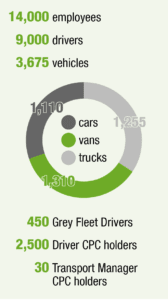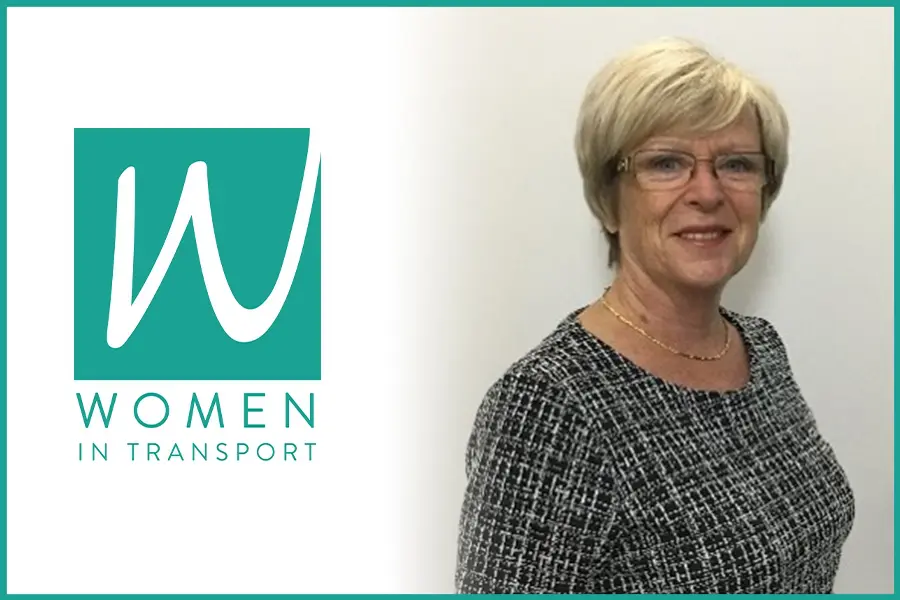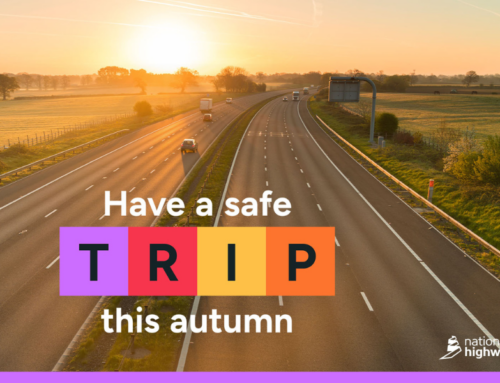1st January 2023
Julie Davies
“It’s all about leadership”
Julie Davies – Group Fleet and Plant Compliance Manager, Amey


Julie Davies gets the kind of company leadership that many other fleet compliance managers might dream of: Amey, a leading infrastructure services and engineering company, has a clear vision of putting people first and has, what it describes as a “relentless pursuit of zero harm”.
Julie has more than 25 years’ experience in the transport industry and with Amey for the last 13 years. In her current role, she is responsible for managing the company’s operator licences and ensuring compliance for a mixed fleet of 3,675 vehicles with 9000 drivers. Her previous roles include working in the haulage and parcel logistics sectors. This has given her extensive knowledge and experience in all aspects of transport, as well as professional certification in both HGV & PSV. She also plays a key role on the Logistics UK Regional Council and National Highways working group.
In 2018, Julie helped to lead the way in Amey becoming a ‘Driving for Better Business Champion’. She promoted engagement with the programme to reduce work related road risk, protect vulnerable road users and improve compliance with current legislation and guidance.
Julie is a leader in the development of innovation and best practice to improve compliance and safety. For example, she implemented a digital compliance system which enables users to undertake mandatory pre use vehicle checks and manage the fleet. When Julie took responsibility for road risk management she developed a new integrated online driver training programme, which will help to drive positive changes in driver attitude and behaviour.
Amey believes that proper attention to the health and safety of its employees, subcontractors, client staff and the community within which the Company operates is a key element of effective business management; injuries are not inevitable, harm is not acceptable, and risks are ours to manage.
Julie sees management of Fleet Risk as particularly important as it affects all road users. “We all use the roads on a regular basis or rely on those who do, and we have a right to do so safely. Amey has a variety of initiatives which help reduce the risks our employees and those around us face when using the road. Fleet safety and compliance is supported by top level engagement.”
We talk about Amey’s core values, one of which is putting people first. This is an organisation that strongly believes that the health, safety and wellbeing of its teams, clients and those around should be the priority over everything else. It states: “We believe injuries are not inevitable. And for us, there’s only one number we find acceptable when it comes to harm and injuries at work – ZERO.”
Julie endorses this: “Target Zero is our aim and we’ve set a new goal to reach a zero Lost Time Injury Incident Rate by 2021. In 2021, across the whole Amey business 97% of our daily operations were delivered incident free and our reportable injuries reduced by a third. This is good, but there is still more we can do, and our ambition is to continue to challenge ourselves to ensure that everyone goes home safe and well every day.
“To stay focused on this goal, this year our emphasis will be on creating a culture of care, moving from rules to relationships, removing risk and ensuring our safety and wellbeing processes enable you to deliver safe operations every day. This sets a real ambition and requirement to focus, which is where our Zero Code comes in. Zero Code is all about the behaviours that we expect our people and supply chain partners to live by. It is a simple work code that highlights the key actions we must all take to protect ourselves and others from harm.”
As part of this, Amey has collaborated with its driver safety partner to provide e-learning across the business promoting road safety and mitigating risks. The solution delivers centralised training to over 9,000 drivers in the UK and Ireland, based on targeted requirements and analysis of driving performance.
Amey wanted a formalised driver training programme that takes a consistent, company-wide approach to address fleet risk, which operates seamlessly within its internal health and safety portal to engage drivers with targeted training.
Julie and her team are now able to quickly address areas of fleet risk by triggering training based on multiple feeds of risk data outputs.
Amey has long established systems and processes to effectively manage the safety and compliance of its commercial fleet drivers. These include:
- Driver Licence checking with Applied Driving Techniques (ADT)
- Pre-drive checks with CheckedSafe
- Telematics for asset management and driver behaviour monitoring
- Digital tachocard recording for domestic driver’s hours
Learning modules cover the most common causes of fleet risk, including speeding, hazard perception, onboard distraction, aggressive driving and driver fatigue. There is also access to new, relevant content for commercial vehicle drivers, such as vulnerable road users, horse riders and the safety bubble.
“The new system has begun adding value quickly with a significant number of employees receiving training,” says Julie. “Feedback from drivers has been extremely positive, with an appreciation that Amey is demonstrating a clear commitment to employee safety and wellbeing, by providing supportive training to those who are exposed are exposed to risks by the nature of their work. One said ‘The training was very eye opening and as a relatively inexperienced driver, I felt like the company values my safety and wellbeing and wants to help me develop my driving competency.’ It feels like we are going in the right direction.”
Amey’s expectation is that the programme will begin to deliver measurable benefits and drive an overall reduction in incidents inside 12 months. Whilst achieving a reduction in insurance related costs is welcome, Amey’s primary aim for the programme is to ensure that all employees receive the appropriate level of support to manage their risk on the road.
Quick questions:
Mobile phone policy?
Amey prohibits all use of mobile phones while driving, including hands-free conversations, recognising that this is one of the highest risk activities a driver might undertake. If I phoned someone and realised they were driving, I would immediately end the call.
Daily walkaround or something more hi-tec?
Amey use CheckedSafe. This is an app which helps driver daily walk-around checks from a digital device. It is simple to use and replaces the cumbersome paper-based method.
This allows the driver carrying out the inspection to speed up the process and submit the results in real time from the App with additional details including photos, time and date stamps, notes on corrective action. Once the check is finished, the report is viewable via an online portal.
What happens if a vehicle ‘fails’ a check?
All failed vehicle compliance checks automatically generate a report which will be sent to a line manager or administrator for inspection and guidance.
Is the cost-of-living crisis affecting drivers maintaining their grey fleet vehicles?
I haven’t noticed this – we keep tabs but we may not know if their cars need new tyres – you hope they are doing their checks, but of course, many of these cars are also used for family transport and people are keen to keep their vehicle going – plus they are given an allowance.
What technology do you specify on your vehicles?
We have tracking on our light commercial, and some of our vehicles have cameras. When a vehicle is specced, we look at the kit in place, or retro-fit it if necessary.
All our vehicles have speed limiters – that’s one thing we insist on.
Do you still feel you have leadership support from the top?
Absolutely. We have great board level support – from Amanda Fisher who is our CEO, and right through the executive on the health and safety side which is Joe Docherty.
How relevant is Driving for Better Business to organisations small or large?
I had very early involvement with DfBB – I met Simon Turner through Fleet 200. It’s great to share knowledge through, for example, case studies. DfBB has achieved a lot and has educated people – and I see lots of organisations joining – it’s getting out there and helping the industry understand the road risk and sharing knowledge. It’s great for the smaller company too. They might not have the expertise in-house so they can access help such as the toolbox talks, or videos about how to write a policy.
Likewise, the case studies are helpful for those new to the business: when faced with a hard sell pushing a bit of tech that you don’t quite understand, it’s great to see how others have tackled the issue. It’s all about sharing knowledge.
Can smaller operators get away with ignoring the rules?
No. It doesn’t matter if you run 5000 vehicles or run 50: you still have to comply with the law.
Why aren’t there more women in this sector?
Logistics isn’t a rufty-tufty job – it’s about meticulousness and attention to detail, and many women are very good at that.
What are the biggest challenges facing logistics and fleet sector?
The cost of fuel and getting younger people into the industry either as adriver or transport manager. It’s not a glamorous industry – people still think it’s an oily rag/dirty hands job – in fact it’s a lot more about computers. It’s a clean, forward-thinking and innovative industry.






